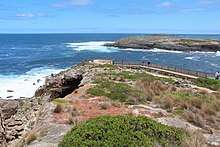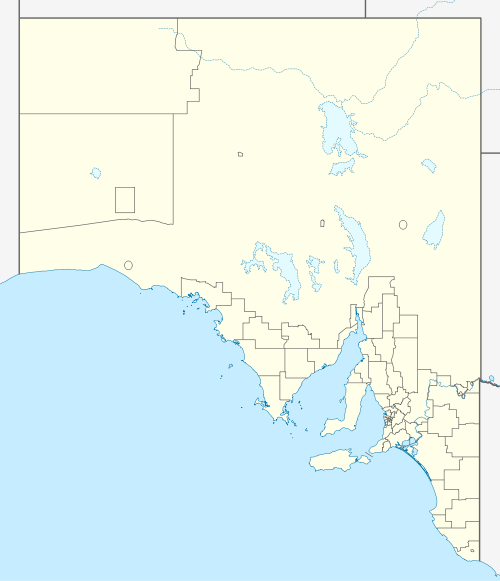Western Kangaroo Island Marine Park (state waters)
Western Kangaroo Island Marine Park is a marine protected area in the Australian state of South Australia located in the state’s coastal waters adjoining both the west coast of Kangaroo Island and Lipson Reef, an islet located to the south of Kangaroo Island.[1][3]:5, map01
| Western Kangaroo Island Marine Park South Australia | |
|---|---|
 View from Cape du Couedic of the Casuarina Islets where a Restricted Access Zone is in force. | |
 Western Kangaroo Island Marine Park | |
| Nearest town or city | Kingscote |
| Coordinates | 35°57′16″S 136°33′10″E[1] |
| Established | 29 January 2009[2] |
| Area | 1,020 square kilometres (390 sq mi)[3]:5 |
| Managing authorities | Department for Environment and Water |
| Website | Western Kangaroo Island Marine Park |
The marine park was established on 29 January 2009 under the Marine Parks Act 2007.[2]
The marine park consists of two areas of water.[3]:5,map 01 The first is the portion of coastal waters adjoining the coastline to the western end of Kangaroo Island extending from the middle of Sanderson Bay on the south coast to Cape Forbin on the north coast. The seaward boundary is the limit of coastal waters which moves away from within 3 nautical miles (5.6 km; 3.5 mi) of the island in a northern-westerly direction towards the Eyre Peninsula while the northern boundary is a line with an east-west alignment and located about 4 kilometres (2.5 mi) north of Cape Forbin.[3]:5,23,26 The second is the coastal waters within 3 nautical miles (5.6 km; 3.5 mi) of Lipson Reef which is located about 16 kilometres (9.9 mi) south-east of Cape du Couedic.[1][3]:5, maps 01–05
The marine park is divided into zones to manage the marine environment to ensure varying degrees of “protection for habitats and biodiversity” and varying levels of “ecologically sustainable development and use” as follows:[1][3]:5,13–14,maps 01–05
- Three “restricted access zones” cover the full extent of Paisley Islet and Casuarina Islets, and the intertidal zone on the coastline adjoining the geological feature known as Remarkable Rocks.
- Three “sanctuary zones” consists of waters between Cape Borda in the west and Cape Forbin in the east off the north coast of the island, the north-western corner of the marine park and the waters off the south coast of the island between Cape du Couedic in the west and Remarkable Rocks in the east.
- Two “habitat protection zones” occupy the remainder of the marine park where “activities and uses that do not harm habitats or the functioning of ecosystems” are only permitted.
The marine park is adjoined at the limits of coastal waters to the south-west by the Western Kangaroo Island Marine Park which is a marine protected area managed by the Australian government.[4]
As of 2016, the marine park has been classified under the IUCN system of protected area categories with the “restricted access zones” being Category Ia, the “sanctuary zones” being IUCN Category II and the “habitat protection zones” being IUCN Category IV.[5][3]:23–26
References
- "Search result for 'Western Kangaroo Island Marine Park' with the following datasets being selected - 'State Marine Park Network', 'State Marine Park Network Zoning', 'SA Government Regions' and 'Gazetteer'". Location SA Map Viewer. The Government of South Australia. Retrieved 6 August 2018.
- "Marine Parks Proclamation 2009 under section 10 of the Marine Parks Act 2007". THE SOUTH AUSTRALIAN GOVERNMENT GAZETTE. Government of South Australia. 29 January 2009. p. 481. Retrieved 17 July 2018.
- "Western Kangaroo Island Marine Park Management Plan 2012" (PDF). Department of Environment, Water and Natural Resources, Government of South Australia. 2012. pp. 5–7, 13-14 and maps 01-05. Retrieved 6 August 2018.
- Director of National Parks (2018). South-west Marine Parks Network Management Plan 2018 (PDF). Canberra: Director of National Parks. pp. 92–94. ISBN 978-0-9876152-4-4. Retrieved 10 July 2018.
- "Marine Protected Areas in coastal waters of South Australia". CAPAD 2016. Australian government. Retrieved 15 January 2018.